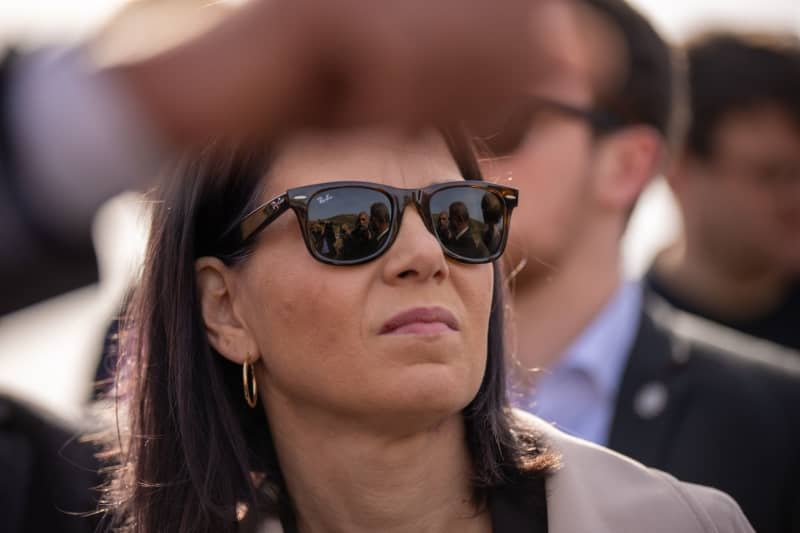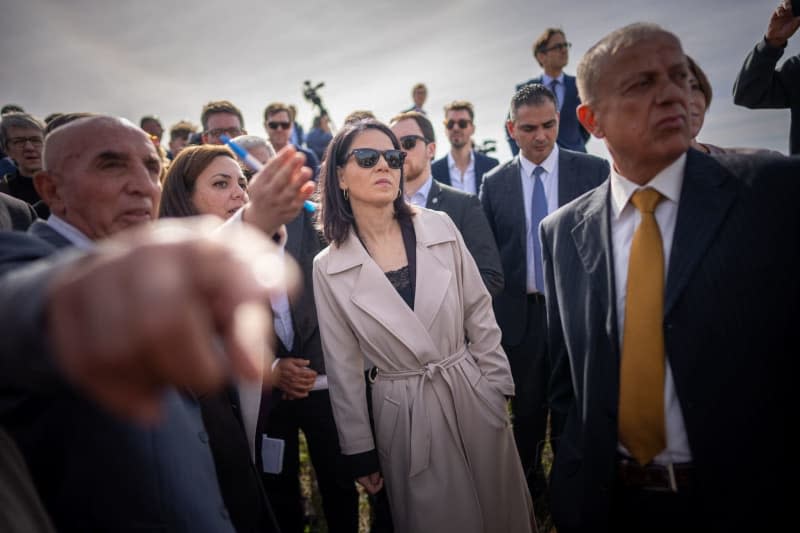Hamas rocket expert killed in Syria, Hezbollah man killed in Lebanon

The Israel Defense Forces (IDF) killed a rocket expert from the Islamist Hamas in Syria on Monday, the IDF said in a Telegram post on Monday, while there were reports that a military commander of the pro-Iranian Hezbollah movement was killed with another person in southern Lebanon.
"Today (Monday), the IDF eliminated Hassan Hakashah in Beit Jinn in Syria," the Israeli military said, adding that Hakashah was "a central figure" responsible for rockets fired from Syria into Israel in recent weeks.
Beit Jinn is south-west of Damascus near the Israeli-occupied Golan Heights. No further details were initially provided.
Hakashah had directed Hamas terror cells that had fired rockets from the northern neighbouring country into Israeli territory, the IDF said.
Israel "will not allow terrorism from Syrian territory and hold Syria responsible for all activity emanating from its territory, the IDF said in its statement on Telegram.
Israel does not normally comment on attacks on opponents abroad. Just hours earlier, an important commander of the Shia militia Hezbollah, Wissam al-Tawil, had been killed in Lebanon in a suspected Israeli drone attack.
A Lebanese security source said that Wissam al-Tawil, code-named Haj Jawad, was killed when an Israeli drone hit the car he was in at Khirbet Selm.
The Hezbollah press office also confirmed his death but did not give his rank.
The Lebanese state-run National News Agency (NNA) reported that the raid carried out by an Israeli drone around 10:15 am (0815 GMT) on the road to al-Dabshah in the town of Khirbet Selm in the Bint Jbeil district had killed two people.
Lebanese security sources said al-Tawil was part of Hezbollah's elite al-Radwan Brigade, the withdrawal of which from areas close to the border Israel has called for.
There was little confirmation of this from the Israeli side just as there was no confirmation from the IDF about the killing of Saleh al-Arouri, the second highest-ranking Hamas leader abroad, last week in Beirut. Many observers believe Israel is behind the al-Arouri killing.
Israel has been fighting the militant Palestinian Hamas in Gaza since the militant group launched a bloody raid on Israel on October 7, killing 1,200 and kidnapping around 240.
Since then Hezbollah in Lebanon, which like Hamas is allied with Iran, has been firing almost daily at Israel, whose army fires back. Israel has also repeatedly come under fire from Syria. Concerns about an expansion of the Gaza war are growing.
Hezbollah's head of the parliamentary bloc, Muhammad Raad, on Monday reiterated his group's position that the violence in southern Lebanon will not stop "unless the aggression on Gaza stops."
German Foreign Minister Annalena Baerbock, who is travelling in the region, earlier on Monday called on the Israeli government to better protect Palestinians in the West Bank from attacks by Israeli settlers and to punish acts of violence.
Amid Israel's war on the Gaza Strip, settler violence towards Palestinians in the West Bank has grown.
Baerbock talked to residents in the Palestinian village of al-Mazra'a al-Qibliya, north-west of the de-facto Palestinian West Bank capital of Ramallah. She again called for a two-state solution, saying "settlement construction is illegal."
In Ramallah, Baerbock met Palestinian Foreign Minister Riyad al-Maliki. She was to hold talks in Israel, including with Defence Minister Yoav Gallant before heading to Egypt and Lebanon.
US Secretary of State Antony Blinken is also travelling the region. He arrived in Israel on Monday evening, as part of a tour of the Middle East, his fourth to the region in four months.
During the trip, Blinken is seeking to discuss concrete steps on how actors in the region could use their influence to avoid an escalation of the Gaza war, his office said.
During the Six-Day War in 1967, Israel took control of the West Bank and East Jerusalem, among other territories. Hundreds of thousands of Jewish settlers now live there, surrounded by around 3 million Palestinians, who have Western backing to form their own state in both the West Bank and Gaza Strip.
The number of Palestinians killed in the Gaza Strip has risen to 23,084 since the start of the war three months ago, according to the Hamas-controlled health authority.
Almost 59,000 people have been injured, a statement added. Within the last 24 hours, 249 people had been killed in Israeli attacks in the coastal strip and around 70% of those killed are said to be women and children. The figures cannot be independently verified.
Israel meanwhile assumes that 136 hostages are still being held in the Gaza Strip and 25 of them are probably no longer alive, an Israeli government spokeswoman said.
The hostages also include the bodies of two soldiers kidnapped during the last major Gaza war in 2014, as well as two other Israelis who have been held in the coastal strip since then.
UN experts warned on Monday that Palestinian perpetrators must be held accountable for brutal killings, abductions and sexual crimes against Israelis.
"The growing body of evidence of reports of sexual violence is particularly distressing," Alice Jill Edwards, the UN Special Rapporteur on Torture, and Morris Tidball-Binz, UN Special Rapporteur on Arbitrary Executions, said on Monday.
Edwards and Tidball-Binz pointed to alleged gang rapes, mutilations and bullet wounds to the genital area. These were not only sexual torture and war crimes, but possibly also crimes against humanity.
"There is nothing that justifies these acts," they said. The experts called for all victims to be recognized and for the crimes to be investigated and prosecuted.


